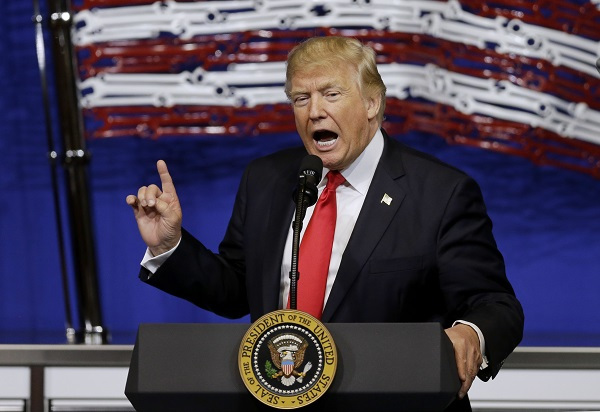Rekindled by his demand for Seoul to pay for the THAAD anti-missile system, US President Donald Trump’s foreign policy approach centered on unrefined, unilateral remarks and Twitter posts is fanning concerns it may undermine the two countries’ 60-year alliance.
On the campaign trail, he repeatedly argued that allies should shoulder a greater share of defense costs and the “job-killing” South Korea-US free trade agreement needs to be negotiated.
Just over 100 days into the Trump presidency, signs are emerging that he has set out to turn his words into reality -- but in a way that could leave even the staunchest ally baffled and complicate close cooperation on pressing matters.
 |
US President Donald Trump (AP-Yonhap) |
The latest furor broke out after the former real estate magnate said in an interview with Reuters on Friday that South Korea should pay $1 billion for the deployment of the Terminal High Altitude Area Defense system and vowed to renegotiate the free trade agreement. He repeated these demands in a separate interview with the Washington Times on Saturday.
The claims apparently took officials by surprise not only in Seoul, but also in Washington, prompting a phone call between National Security Office chief Kim Kwan-jin and National Security Adviser H.R. McMaster.
South Korea said a renegotiation on THAAD is inconceivable, as the sides have already struck a deal, in which Seoul provides the land and related facilities and the US funds the system’s operation and maintenance.
Yet McMaster’s efforts to alleviate the controversy, including an additional press interview ended up aggravating it.
BuzzFeed reported Saturday that the Pentagon had not been informed of the THAAD payment issue, quoting a defense official as saying, “Nobody here is making up a bill for the South Koreans.” White House press secretary Sean Spicer
John Kirby, a retired Navy rear admiral and former spokesman for both the State and Defense departments who now is a national security analyst at CNN, assumed that Trump’s own national security team must have been “taken aback” by his assertion. “This isn’t some real estate deal. It’s a nation-state deal, a national security deal. And in deals like this, trust -- not cash -- is the coin of the realm. Unfortunately, Mr. Trump just spent a fortune of that,” he said in a commentary.
The THAAD demand is the latest in a series of controversial comments Trump has made during media interviews and via his Twitter account, which critics say disregard diplomatic protocol and lack sufficient contextual explanations.
Last month, the peninsula grappled with an unanticipated flare-up in tension after Trump and his top aides mistakenly said a US aircraft carrier strike group was rerouting toward here ahead of a major North Korean holiday.
“I bet the administration officials were also struggling as much as we are to deal with the president’s unique way of communication and unconventional choices of words,” an official at the Foreign Ministry here said, requesting anonymity due to the sensitivity of the matter. “But the problem is that you are not supposed to contradict what the commander-in-chief has said, however uncoordinated and misleading it may be.”
A retired Seoul diplomat said, “What’s more troubling about Trump’s way of executing what he thinks of as foreign policy is that it may well keep inciting public sentiment over moderately contentious issues, which would gradually erode overall support for the alliance, making it extremely difficult for the next government to proceed with a soundest policy going forward.”
Trump’s comments also prompted censure among US Democratic politicians, with House Democratic leader Nancy Pelosi accusing him of denting the longstanding alliance.
“Trump proved once again that he’s out of his depth in the White House,” she said in a statement marking the president’s 100th day in office, pointing out his remarks on THAAD and the FTA.
“The unpredictable bluster and bravado that was a defining characteristic of Trump in the private sector becomes embarrassing and dangerous for the country when deployed by the president in the Oval Office.”
On his Twitter page, Sen. Ben Cardin, a senior member of the Senate Foreign Relations Committee, also urged Trump not to “divide” the alliance, especially in the face of escalating tension with North Korea.
Sen. Ed Markey also blasted Trump’s “inconsistent” messages toward Pyongyang and “disrespectful” attitude toward Seoul.
“The president’s talk of war and inconsistent messages from administration officials can only fuel Kim Jong-un’s paranoia and increases the chances of an accidental war that could kill millions of people on the Korean Peninsula,” the senator said in a separate statement.
“Instead of the president‘s damaging and disrespectful rhetoric towards South Korea, we need to reaffirm and strengthen our alliance with this key partner that is home to millions of people, including American troops and their families.”
By Shin Hyon-hee (
heeshin@heraldcorp.com)







![[Today’s K-pop] Blackpink’s Jennie, Lisa invited to Coachella as solo acts](http://res.heraldm.com/phpwas/restmb_idxmake.php?idx=644&simg=/content/image/2024/11/21/20241121050099_0.jpg)
